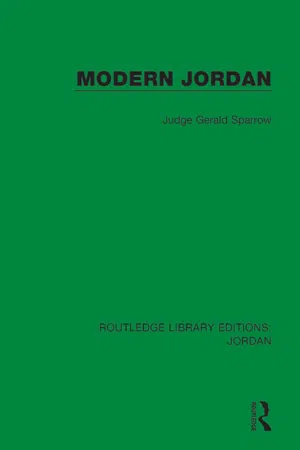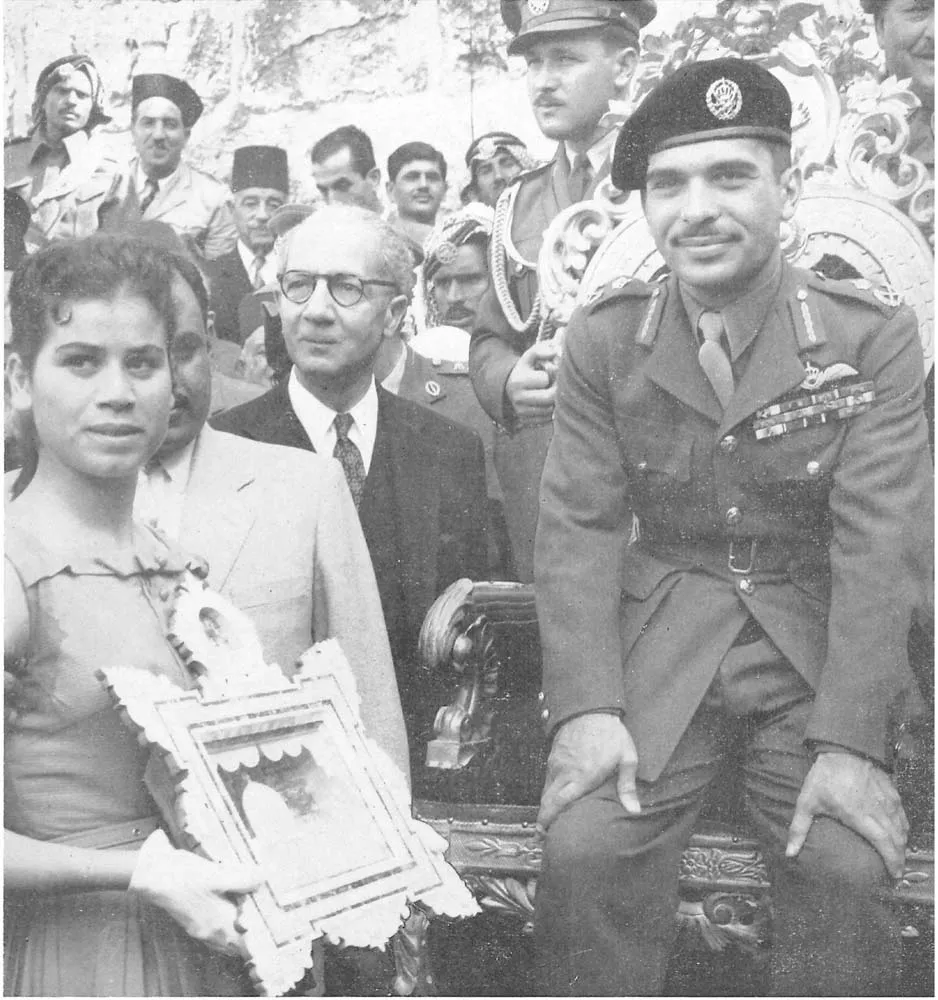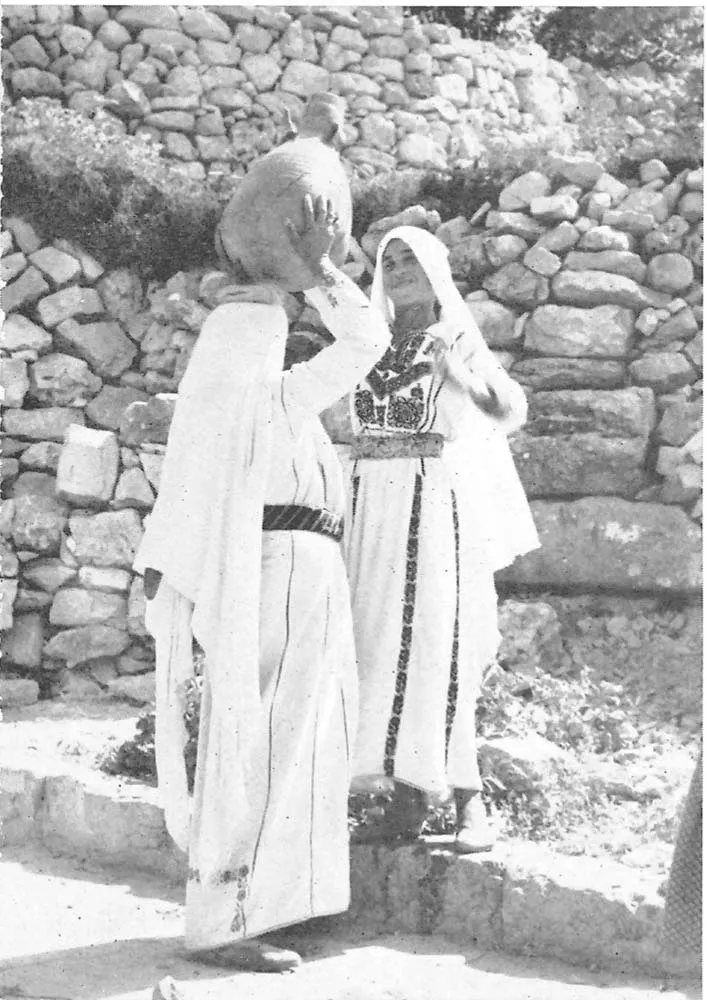
- 180 pages
- English
- ePUB (mobile friendly)
- Available on iOS & Android
eBook - ePub
Modern Jordan
About this book
This book, first published in 1961, covers the whole range of the Hashemite kingdom, its king, its government, the people, the land, industry, the armed forces and the rich history of the country. The aim of this book is to present a living picture of a live and virile people linked by language, blood and faith to the other Muslim lands, and in doing so present a snap-shot of the country in the middle of the twentieth century.
Tools to learn more effectively

Saving Books

Keyword Search

Annotating Text

Listen to it instead
Information
I
Jordan in General
OUTLINE OF THE HASHEMITE KINGDOM OF JORDAN TODAY
The kingdom of Jordan, in its present form, is just ten years old, for it was on April 24th, 1950, that both houses of the Jordanian legislature, by a unanimous decision, united East and West Jordan. The unity that was then achieved in law is only now being cemented by a unified economy and common interest.
West Jordan consisted of that territory that remained from the mandate of Palestine after the new state of Israel had been created by the Jewish National Council on the 15th of May, 1948. East Jordan comprised the Amirate of Trans-Jordan which had been ruled by the Emir Abdullah in close treaty relationship with the British Government. The Emir, King Hussein’s grandfather, became the first King of the new state of Jordan.
Jordan has four neighbours on her borders. The kingdom is bounded on the north by Syria, a part of the United Arab Republic, on the west by Israel, on the south by Saudi Arabia, and on the east by Iraq.
The border with Iraq is a ‘new’ one. Prior to the Iraq revolution the King of Iraq. His Majesty King Feisal II, and King Hussein of Jordan had united their countries in the Arab union, abolishing border barriers and customs duties between the two countries, and initiating a complete unity of policy and purpose designed to form a stabilising central point in the turbulent Middle and Near East.
In July, 1958, the yong King Feisal of Iraq, the former Regent Prince Abdullah, the Prime Minister, General Nuri-es-Said, and all the resident members of the royal house, including some infant princesses, were brutally murdered in a revolution headed by Abdul Karim Kassem and Abdul Salem Arif. Jordan decided to seal off her old border with Iraq and this border has, so far, been respected by the quasi-communist regime now ruling in Baghdad.
The Jordanian border with Israel is the longest border between Israel and her neighbours and, as the Jordan army and the Israeli army are the only military forces in the Near East that have proved their reliability in battle, this border is a focal point in near eastern affairs.
The population of Jordan is placed at 1,400,000, though this figure is not presented as completely accurate. In near eastern countries it is very difficult to estimate the exact numbers of the nomadic Bedouin tribes, partly because they pass over national borders in the desert without ceremony, and partly because there is a reluctance to give the numbers of the women in each tribe.
Of the total population of Jordan half a million are Arab refugees from Palestine, and here, again, the figure is an estimate rather than an accurate census. Peculiar difficulties confront officials trying to estimate the exact population of the huge refugee camps of Jordan. One is that very few deaths are ever reported to the authorities, the families concerned being reluctant to loose their ration cards. Births, however, are always reported, and this factor, alone, makes the figure given a provisional one. Whatever the real figures may be we are confronted with the astonishing position of a nation which is playing host to a population equal to nearly half the number of its indigenous people. This gigantic population of refugees is maintained by the Jordan government with the help of UNWRA, and it explains, in modern terms, the stress I have placed on hospitality as an Arab characteristic.
The government of Jordan consists of His Majesty the King, his Council of Ministers, and the Legislature which, in turn, comprises a Senate of 25 persons nominated by the King, and a House of Representatives of 50 freely elected members. It is fair to comment that the establishment of a complete, working democracy in Jordan still has a long way to go, but that rapid strides are being made to this end.
Jordan is, at present, almost entirely an agricultural country, though her production of raw phosphate is considerable, and important to the national economy. The possibility of discovering great oil and mineral reserves has not been overlooked, and an American company is strenuously attempting to discover oil in profitable quantity and quality. West Jordan is fertile farming land. East Jordan is mainly barren desert, but the eastern half of the Jordan valley is productive, as is an area in the mountainous north-eastern districts of Jordan.

1. His Majesty King Hussein at St Joseph’s School, Bethlehem

2. The height of the unrest in Jordan; 1957. Anti-Government and Anti-American banners in Amman

A woman helps a friend to lift an earthen jar of water on to her head
The Moslem religion is the state religion of Jordan, the majority of the population being Sunni Moslems. In Jerusalem the holy places of Islam are preserved side by side with the Christian shrines, and complete religious tolerance among adults and in the schools is observed by the Jordan Government.
Communications are rapidly improving. A fine new motorway, built with American funds, now links Amman and Jerusalem. Plans have been approved for linking Amman with the port of Aquaba in the gulf of Aden, and a widespreading train, road, and air link between Amman, Jerusalem, and the outlying provinces, is in active realization. At present Jordan is most easily entered by air from Beirut, though the reopening of diplomatic relations with the United Arab Republic has led to the reopening of the Damascus road into Syria. Although most of the city and holy places of Jerusalem are in the Jordanian section of the city, some are located in the Israeli sector.
The young King of Jordan, King Hussein I, succeeded to the throne on August 11, 1952, after the deposition of his father, King Talal, and assumed constitutional powers on May 2, 1953, on coming of age at eighteen. The King, in recent years, has made an impact on public opinion both in the United States and in Europe, in particular in Britain, by adopting modern means of mass communication, such as television, to speak to the people. He has also won notable diplomatic victories after surviving the violent political unrest in Jordan during 1956. There is no doubt that the kingdom of Jordan now has the most positive assurances from the West that her sovereign independence will be maintained with all the aid that she needs to balance the Jordan budget, and to maintain the Jordan army as a guarantee of the country’s integrity.
When starting our study of Jordan, as it is today, it is important to bear in mind that the old division of Jordan into Eastern Palestine and the Amirate of Trans-Jordan has left behind a heritage of two types of Jordanians with contrasting customs and aptitudes. The Palestinian Arab, is, on the whole, better educated and more modern than the Arab people of the old Amirate. It is thought that, in politics, too, he leans more towards a liberal conception of government along the lines instilled by the British authorities during the twenty-five years of their highly successful mandate. The Arabs of eastern Jordan, in particular the sheiks and the Bedouin people, are far more traditional, both in their manners and in their philosophy. They do not, as a rule, compare with the Palestinian Arab in learning and applied skills.
It has been the mission of the young King to weld together the two limbs of his country so that they would truly be one people and even the most critical observers of the Jordan scene admit that, in this ambition, he has met with unexpected success.
The greatest remaining weakness of the state of Jordan is the difficulty, under present circumstances, of balancing the budget. The 1959 figures show a revenue of nearly twenty million dinars but an expenditure of over thirty million. The deficit is met by foreign aid, formerly mainly British, now mainly American, though Britain still makes substantial contributions. It is a fair and necessary comment that the additional expenditure is incurred largely because Jordan has assumed international obligations on which the West depends in particular maintaining the peace on the long Israeli and Iraq frontiers, and in helping to maintain the huge population of Arab refugees who depend on the Jordan Government for the land, and houses, that keep them alive. No small State has ever, in recent years, assumed such great responsibilities, and this fact should never be lost to sight by those who complain that the modern state of Jordan is an ‘uneconomic’ unit. There is no doubt that, if Jordan turned her back on the outside world she could maintain and protect herself, but this would be a disaster for western civilization, including in the long run, not only the NATO powers, but the state of Israel and the Soviet Union as well.
Jordan is the heir to great civilizations. In the 18th century BC the biblical figures of the old testament, Abraham and his descendents, lived here. In the 16th century BC came the first Egyptian conquest of Palestine. In the 12 century the Hebrew tribes occupied both banks of the river Jordan.
Alexander the Great came here as conqueror, and the majestic remains, amazingly complete, of the Greek and Roman empires are described in this book.
This land was the birth-place of Christ, the cradle of the Christian faith. It witnessed the advent of Mohammed and the spread of Islam, followed by the great Islamic and Arab empire of the seventh and eighth centuries AD.
The Crusaders came to Jordan, bringing their faith with them. Their castles, with their banqueting halls and stables, stand today. Then Islam swept back again in the Ottoman Empire of Turkey from 1517 to 1917.
Finally, for a short period, came the British exercising a mandate on behalf of the League of Nations. That was the end of alien domination. The next step was freedom. A new state was born in the turbulent days that followed World War II. This state is the modern Hashemite kingdom of Jordan with which we are concerned.
The capital of Jordan, Amman, is a city of a quarter of a million citizens that has sprung from a village in the extraordinary and rapid advance of the whole state of Jordan during the last decade. Built of the rose-red stone that is quarried locally, on seven hills, it makes a novel and attractive capital.
With this brief description of Jordan in general we can now examine Jordan in detail, a survey which will include the government, the people, their faith, the Bedouins, the refugees, the wonders of Jordan, the armed forces and the immense tourist attractions of Jordan, hitherto, except for Jerusalem, almost unexplored.
2
The King in Jordan
Any attempt to estimate the power and the influence of the King in Jordan is no easy matter. The Constitution of Jordan divides power into its legislative, executive and judicial categories and these distinctions, in the English translation, appear to be clear enough. The language of the original document, however, is looser, and a large residue of power is left in the hands of the King and his Prime Minister.
Among the vital prerogatives which the King retains is the appointment of the Senate, and the right to dismiss and summon parliament. In fact, in Jordan today the government is best described as a paternal monarchical democracy.
King Hussein, very recently, said:
‘I wish I could be an ordinary person in a strong free Arab world instead of a King who might be an obstacle to unity.’ And he added that he has a mission to fulfill, and is dedicating his life to its accomplishment. The mission is the making of a true Jordan nation.
To the critics who declare that the present regime in Jordan is undemocratic, the King can justly reply that, had it not been for his personal initiative and leadership, there would be no state of Jordan today. It would certainly have been torn asunder between the years 1954 and 1956. So that, at the incredibly early age of twenty-five, the King can claim that Jordan owes her very existence to his long and only recently successful efforts.
To realise what an epic struggle this has been let us follow in brief outline the course of events since the King took over active control in Jordan in 1953.
From his first day as King, Hussein has faced these major problems:
1. The suspicion and distrust between the Palestinian Jordanians and the Trans-Jordanians. The Palestinians resented the power held in the government by the Bedouin supporters of the Hashemite house who, in their turn were fearful of being exploited by the highly educated and skilled Palestinians.
2. The external pull for power directed at Jordan by the western allies; by those who sympathised with President Nasser, and by the agents of the communist party in Jordan. The King has had to pick his way between these conflicting interests, trying, always, to assert the interest of Jordan without giving in either to the Anglo-American bloc, to the United Arab R...
Table of contents
- Cover
- Half Title
- Title Page
- Copyright Page
- Table of Contents
- FOREWORD
- 1. Jordan in General
- 2. The King in Jordan
- 3. Political Parties in Jordan
- 4. How Jordan is Governed
- 5. Jordan and Her Neighbours
- 6. The Armed Forces
- 7. The People, their Faith and their Customs
- 8. Agriculture and Industry
- 9. The Bedouins
- 10. The Refugees
- 11. Tourism in Jordan
- 12. The Wonders of Jordan
- 13. The Future of Jordan
- APPENDIX
- INDEX
Frequently asked questions
Yes, you can cancel anytime from the Subscription tab in your account settings on the Perlego website. Your subscription will stay active until the end of your current billing period. Learn how to cancel your subscription
No, books cannot be downloaded as external files, such as PDFs, for use outside of Perlego. However, you can download books within the Perlego app for offline reading on mobile or tablet. Learn how to download books offline
Perlego offers two plans: Essential and Complete
- Essential is ideal for learners and professionals who enjoy exploring a wide range of subjects. Access the Essential Library with 800,000+ trusted titles and best-sellers across business, personal growth, and the humanities. Includes unlimited reading time and Standard Read Aloud voice.
- Complete: Perfect for advanced learners and researchers needing full, unrestricted access. Unlock 1.4M+ books across hundreds of subjects, including academic and specialized titles. The Complete Plan also includes advanced features like Premium Read Aloud and Research Assistant.
We are an online textbook subscription service, where you can get access to an entire online library for less than the price of a single book per month. With over 1 million books across 990+ topics, we’ve got you covered! Learn about our mission
Look out for the read-aloud symbol on your next book to see if you can listen to it. The read-aloud tool reads text aloud for you, highlighting the text as it is being read. You can pause it, speed it up and slow it down. Learn more about Read Aloud
Yes! You can use the Perlego app on both iOS and Android devices to read anytime, anywhere — even offline. Perfect for commutes or when you’re on the go.
Please note we cannot support devices running on iOS 13 and Android 7 or earlier. Learn more about using the app
Please note we cannot support devices running on iOS 13 and Android 7 or earlier. Learn more about using the app
Yes, you can access Modern Jordan by Judge Gerald Sparrow in PDF and/or ePUB format, as well as other popular books in Social Sciences & Regional Studies. We have over one million books available in our catalogue for you to explore.